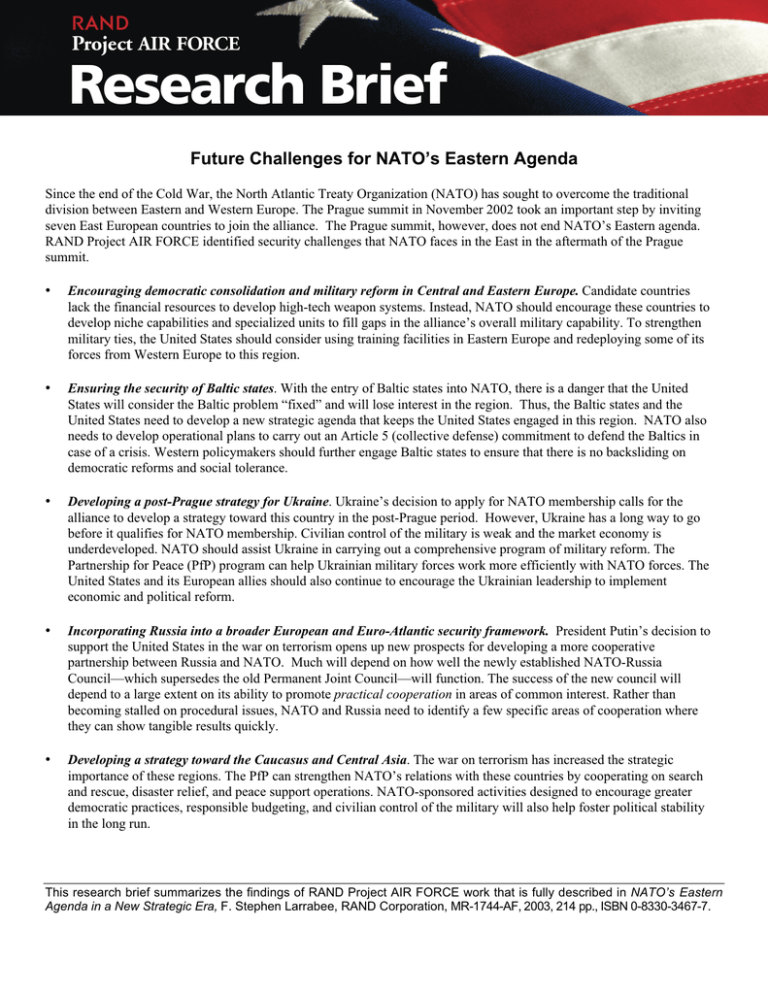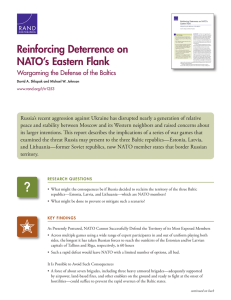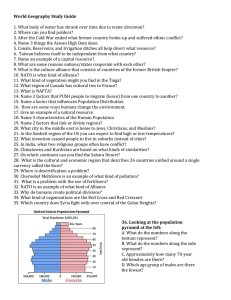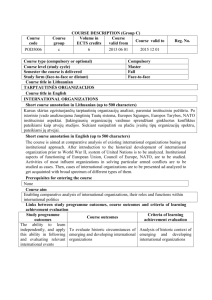Research Brief R Project AIR FORCE
advertisement

R Project AIR FORCE Research Brief Future Challenges for NATO’s Eastern Agenda Since the end of the Cold War, the North Atlantic Treaty Organization (NATO) has sought to overcome the traditional division between Eastern and Western Europe. The Prague summit in November 2002 took an important step by inviting seven East European countries to join the alliance. The Prague summit, however, does not end NATO’s Eastern agenda. RAND Project AIR FORCE identified security challenges that NATO faces in the East in the aftermath of the Prague summit. • Encouraging democratic consolidation and military reform in Central and Eastern Europe. Candidate countries lack the financial resources to develop high-tech weapon systems. Instead, NATO should encourage these countries to develop niche capabilities and specialized units to fill gaps in the alliance’s overall military capability. To strengthen military ties, the United States should consider using training facilities in Eastern Europe and redeploying some of its forces from Western Europe to this region. • Ensuring the security of Baltic states. With the entry of Baltic states into NATO, there is a danger that the United States will consider the Baltic problem “fixed” and will lose interest in the region. Thus, the Baltic states and the United States need to develop a new strategic agenda that keeps the United States engaged in this region. NATO also needs to develop operational plans to carry out an Article 5 (collective defense) commitment to defend the Baltics in case of a crisis. Western policymakers should further engage Baltic states to ensure that there is no backsliding on democratic reforms and social tolerance. • Developing a post-Prague strategy for Ukraine. Ukraine’s decision to apply for NATO membership calls for the alliance to develop a strategy toward this country in the post-Prague period. However, Ukraine has a long way to go before it qualifies for NATO membership. Civilian control of the military is weak and the market economy is underdeveloped. NATO should assist Ukraine in carrying out a comprehensive program of military reform. The Partnership for Peace (PfP) program can help Ukrainian military forces work more efficiently with NATO forces. The United States and its European allies should also continue to encourage the Ukrainian leadership to implement economic and political reform. • Incorporating Russia into a broader European and Euro-Atlantic security framework. President Putin’s decision to support the United States in the war on terrorism opens up new prospects for developing a more cooperative partnership between Russia and NATO. Much will depend on how well the newly established NATO-Russia Council—which supersedes the old Permanent Joint Council—will function. The success of the new council will depend to a large extent on its ability to promote practical cooperation in areas of common interest. Rather than becoming stalled on procedural issues, NATO and Russia need to identify a few specific areas of cooperation where they can show tangible results quickly. • Developing a strategy toward the Caucasus and Central Asia. The war on terrorism has increased the strategic importance of these regions. The PfP can strengthen NATO’s relations with these countries by cooperating on search and rescue, disaster relief, and peace support operations. NATO-sponsored activities designed to encourage greater democratic practices, responsible budgeting, and civilian control of the military will also help foster political stability in the long run. This research brief summarizes the findings of RAND Project AIR FORCE work that is fully described in NATO’s Eastern Agenda in a New Strategic Era, F. Stephen Larrabee, RAND Corporation, MR-1744-AF, 2003, 214 pp., ISBN 0-8330-3467-7. Copies of this research brief and the complete report on which it is based are available from RAND Distribution Services (Telephone: 310-451-7002, toll free 877-584-8642; FAX: 310-451-6915; or email: order@rand.org). Abstracts of RAND ® documents may be viewed at www.rand.org. Publications are distributed to the trade by NBN. RAND is a registered trademark. The RAND Corporation is a nonprofit research organization providing objective analysis and effective solutions that address the challenges facing the public and private sectors around the world. Its publications do not necessarily reflect the opinions or policies of its research sponsors. 1700 Main Street, P.O. Box 2138, Santa Monica, California 90407-2138 * Telephone 310-393-0411 * FAX 310-393-4818 1200 South Hayes Street, Arlington, Virginia 22202-5050 * Telephone 703-413-1100 * FAX 703-413-8111 201 North Craig Street, Suite 202, Pittsburgh, Pennsylvania 15213-1516 * Telephone 412-683-2300 * FAX 412-683-2800 RB-97-AF (2003)







